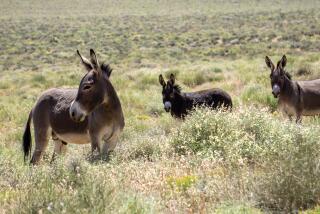Humane Society blasts BLM on removal of wild mustangs in Nevada
- Share via
LAS VEGAS — A national animal advocacy group excoriated the federal government, saying it misled the public about last week’s removal of 11 wild mustangs that had coexisted for years with residents of a populated area outside Carson City, Nev.
The Humane Society of the United States has called for the Bureau of Land Management to return the animals to the wild, rather than following through on plans to put them up for adoption.
“The Humane Society of the United States denounces the Bureau of Land Management’s decision to remove a small band of wild horses located just east of Carson City, Nev., in the Pine Nut Herd Management Area,” according to a statement released by the group Tuesday. “This small group of 11 horses has been a cherished attraction to the community members for more than 40 years.”
The statement added, “Once the horses are returned to the wild, the BLM should work with the local community groups that have offered assistance in the management of this well-known group.”
The debate over wild horses has raged across 11 Western states. BLM officials say the horses overgraze and damage public lands. Animal advocates and others say BLM officials are intent on removing as many wild horses as possible without considering such alternatives as birth control.
BLM officials have said the Carson City-area animals had strayed from the federally designated herd management area, crossing busy roadways and damaging property to graze in a small public park.
The agency said it received several complaints in 2011 and 2012 about property damage and one report of a resident being chased up a tree by a wild horse, one of the many that crossed the Carson River into River View City Park.
But the Humane Society in its statement said that the complaints were at least 2 years old and had already been mitigated. Officials also questioned the BLM’s handling of the nation’s 80,000 or more wild mustangs.
“The removal of these horses from their home without notifying interested stakeholders contradicts BLM’s recent announcement that it would increase agency transparency,” said Holly Hazard, senior vice president of programs and innovations for the group, according to the statement. “Working with the local community to manage this herd would have been the right choice, but instead the BLM has added these horses to its inventory of nearly 50,000 wild horses now kept in holding facilities, which are already costing taxpayers $43 million a year.”
The Carson City horses were gathered over several days, lured into a trap with offerings of alfalfa and barley.
Erica Haspiel-Szlosek, a BLM spokeswoman in Nevada, told the Los Angeles Times that the horses had become an aggressive nuisance.
“They had worked their way out of a herd management area and into neighborhoods. Even one complaint would have been enough to take action and we admit that we let it go longer than we should have,” she told The Times.
“But in the end, these horses were fighting with domestic horses. Parents were concerned about their kids’ safety. They wanted us to do something. And when horses wander outside their herd management area, we’re obligated to step in.”
But the Humane Society said that the BLM misled local residents into thinking that they had a say in the removal of the horses. A committee of 24 residents worked for months hoping to reach a compromise with federal officials, offering to provide fencing and additional road signs at their own expense.
But the residents said their suggestions were brushed aside by BLM officials.
“The BLM hosted a meeting just weeks before the removal, asking for public input and possible solutions. Several groups submitted detailed proposals that included monetary resources to purchase and build fences and water troughs, as well as the application of fertility control vaccines that would help control the population over time,” the group said.
“The BLM refused the assistance and removed the horses from the wild without notifying local advocates. Residents immediately noticed the missing horses and had to call the BLM to learn of their removal.”
Haspiel-Szlosek said the agency’s motives have been misconstrued.
“I understand that what we did seemed cold to people, but that was never our intent — the intent was to solve a public problem,” she told The Times. “We looked at everything proposed, but our field manager felt that the community solutions didn’t solve our safety concerns.”
She added, “These horses are managed by the BLM. In the end, they were both out of their herd management and they were causing trouble.”
She said that four of the horses have been adopted by a person in Colorado but that the remaining seven will be made available for adoption by local residents. “That way, these horses can stay in an area to which they’re accustomed,” Haspiel-Szlosek said. “We’re trying to mend fences here.”
She blamed the horses’ fate on the fact that some people tried to domesticate wild animals.
“These wild horses spent part of the day in herd management area and most of the day wandering neighborhoods, being fed apples and carrots,” Haspiel-Szlosek said. “In time, their behavior changed. They wanted to find apples and carrots. Neighbors were treating them more like pets and less like wild animals.”
She added, “That led to behavior on the horses’ part. Whether to scrub for plants or get apples fed to you by hand. It’s no surprise they picked the apples.”
john.glionna@latimes.com
ALSO:
Portland man charged in aiding suicide bomber in Pakistan
Civil rights group warns of rising danger from extreme right
South Dakota’s Pine Ridge tribe is a ‘breaking point’ over alcohol
More to Read
Sign up for Essential California
The most important California stories and recommendations in your inbox every morning.
You may occasionally receive promotional content from the Los Angeles Times.














